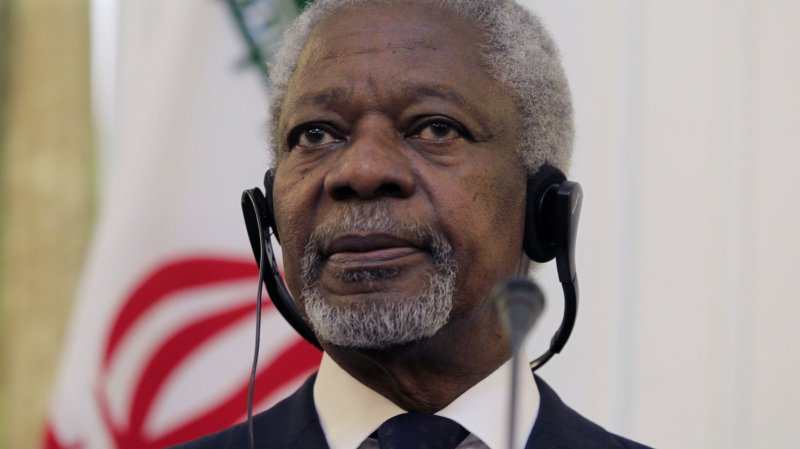UN-Arab league envoy Kofi Annan in Tehran, Iran on July 10,2012. As the UN-Arab League joint special envoy on Syria, Annan has repeatedly emphasized that Iran should be ‘part of the solution’ to the Syrian crisis. UPI/Maryam Rahmanian |
License Photo
DAMASCUS, Syria, July 13 (UPI) -- The reported massacre in Tremseh violates Syria's agreement to refrain from using heavy weapons against civilians, Special Envoy Kofi Annan said Friday.
Reports 220 people were killed in the village come from anti-government activists, The Guardian reported. Gen. Robert Mood, head of the U.N. monitoring mission, confirmed heavy artillery, tanks and helicopters were in the village.
Also Friday, Syrian media reported a large explosion in Damascus, possibly from a car bomb, CNN said.
Annan, special envoy for the United Nations and Arab League, said he was "shocked and appalled" by the reports from Tremseh. He said the government of President Bashar Assad has violated its "undertaking to cease the use of heavy weapons in population centers and its commitment to the six-point plan."
Amnesty International said the Syrian government must allow U.N. monitors access to all parts of the country. The group also called on the United Nations to strengthen its Syrian mission.
"U.N. human rights monitors should have a rapid reaction capability to investigate specific incidents and a permanent presence in cities outside Damascus," said Ann Harrison, deputy director for North Africa and the Middle East.
Tremseh was attacked Thursday. More than 100 other people, including children, were killed across the country Friday, the opposition said.
Survivors and activists said gunmen went from house to house in Tremseh to execute some people and others were fatally shot as they tried to flee the village in Hama province, Britain's Daily Telegraph reported Friday.
The Syrian government said 50 people had died and the slaughter was carried out by rebels and foreign operatives.
The attack was the third large-scale massacre in Syria since May, the Telegraph said. All of the attacks involved Sunni villages in areas dominated by members of Assad's Alawite minority.
The Tremseh operation began when the army barricaded roads into the village, then began its assault using tanks, mortars and helicopter gunships, activists said.
Many of those killed died when shells struck a mosque where villagers had sought shelter, one activist told the Telegraph. Once rebels defending the village were overwhelmed, government troops and militia members moved in and systematically executed survivors, activists said.
Syria's main opposition alliance, the Syrian National Council, said the international community must act.
"To stop this bloody madness, which threatens the entity of Syria as well as peace and the security in the region and in the world, requires an urgent and sharp resolution of the [U.N.] Security Council under Chapter 7 [of the U.N. Charter], which protects the Syrian people," the Syrian National Council said.
Chapter 7 allows for punitive measures against governments considered a threat to peace.
"We expect members of the Security Council to assume total responsibility to protect defenseless Syrians against these shameful crimes," the council said, calling the massacre "among the more infamous genocides of the Syrian regime."
Annan's six-point peace plan has been ignored despite repeated pleas by Annan to abide by it.
The Syrian Network for Human Rights and the Damascus Center for Human Rights Studies said they documented 109 deaths across Syria Friday.
Most of the casualties were from "indiscriminate gunfire" or "indiscriminate shelling" by security forces.
The agencies said 28 people died in the Damascus area, 26 in Homs, 23 in Hama, 17 in Idleb, six each in Deir Ezzor and Daraa, and 3 in Aleppo.
U.S. officials told The Wall Street Journal Syria is moving chemical weapons out of storage, saying they feared Damascus might use the undeclared stockpiles of sarin nerve agent, mustard gas and cyanide against anti-regime rebels or civilians, possibly in an ethnic cleansing campaign.















